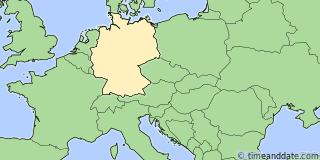Mar 29, 2026, 2:00 am
Mar 30
Forward 1 hour
Mar 30, 2025 - Daylight Saving Time Started
When local standard time was about to reach
Sunday, March 30, 2025, 2:00:00 am clocks were turned forward 1 hour to
Sunday, March 30, 2025, 3:00:00 am local daylight time instead.
Sunrise and sunset were about 1 hour later on Mar 30, 2025 than the day before. There was more light in the evening and less light in the morning.
Also called Spring Forward, Summer Time, and Daylight Savings Time.
More info:
Europe Start DST 2025
Oct 26
Back 1 hour
Oct 26, 2025 - Daylight Saving Time Ended
When local daylight time was about to reach
Sunday, October 26, 2025, 3:00:00 am clocks were turned backward 1 hour to
Sunday, October 26, 2025, 2:00:00 am local standard time instead.
Sunrise and sunset were about 1 hour earlier on Oct 26, 2025 than the day before. There was more light in the morning and less light in the evening.
Also called Fall Back and Winter Time.
More info:
DST 2025: Your Guide to the Clock Change
What’s Next for Daylight Saving Time in the EU?
Europe Ends DST 2025
When Does DST Start and End in Germany?
All of Germany uses Daylight Saving Time (DST) during part of the year. The DST period starts on the last Sunday of March and ends on the last Sunday of October, together with most other European countries.
Central European Time (CET) is used as standard time, while Central European Summer Time (CEST) is observed when DST is in force.
Daylight Saving Time History in Germany
- Germany first observed Daylight Saving Time in 1916.
- Germany has observed DST for 59 years between 1916 and 2025.
- Previous time with no Daylight Saving Time was 1979.
- See Worldwide DST Statistics
First Country to Use DST
Although a small town in Canada had experimented with seasonal clock changes as early as 1908, Germany was the first country to use nationwide DST. On April 30, 1916, at the height of World War I, the German Empire turned its clocks forward for the 1st time. Many European countries followed suit just weeks later.
The measure was abolished after the war, only to be re-introduced during World War II. From 1940 to 1942, Germany observed year-round DST.
After World War II, parts of Germany controlled by the Soviet Union followed doppelte Sommerzeit, double DST, advancing their clocks by 2 hours instead of 1. The rationale was to synchronize German clocks with the local time in Moscow.
DST was discontinued in 1950. In 1980, following an initiative by East Germany, the country re-introduced the measure. Though controversial, DST has been used in Germany ever since.
Since Switzerland did not introduce DST until 1981, the German exclave of Büsingen, which is situated within Swiss territory, did not observe DST together with the rest of Germany in 1980.
